Voyage to a wealthy land, a cyclone and a haircut
To return to my homepage please go to www.cyclinghomefromsiberia.com
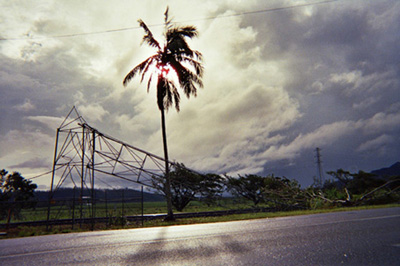
Cyclone Larry had gusts of 290 km per hour
Km cycled: 17,900
Current Location: Byron Bay, Australia
“There is no easy walk to freedom anywhere, and many of us will have to pass
through the valley of the shadow of death again and again before we reach
the mountaintop of our desires” – Nelson Mandela
“Australia is by far the driest, smallest, flattest, most infertile,
climatically most unpredictable, biologically most impoverished Continent”
Jared Diamond
——
For most of February I once again had to play the waiting game this time
from within barbed expatriate compounds in the ill reputed capital city of
Papua New Guinea (Port Moresby). Little smoke fires dot the barren hillsides
amidst the shambled slums and posh brick houses along a beautiful coastline
of palm studded beaches; cars drive around lazily; local people squat and
sit on street corners chewing “beetlenut” (the unanimously popular local
soft drug which turns your teeth red). This could be such a pleasant,
relaxed city like a Cape Town of the East but (due to violent crime) it
is actually one of the most dangerous cities in the world, and that spoilt
it completely.
And all the while the Coral Sea lay waiting before me. It spread southwards
on and on, churning and straining like an endless horizon until at last, out
of sight, it touched the living cliffs of Australia. Since I had touched
down in remote eastern Russia a year and a half previously I had aimed to go
all the way to Australia (and eventually England) without flying any of the
route (I made up this rule on the basis that flying is rather expensive and
just a bit too easy). I had cycled the undulating landscapes of Siberia and
Asia (catching ferries across the sea where necessary) as far as Hong Kong,
and then proceeded to hitch hike on yachts and cargo ships, island hopping
through the Philippines, Indonesia and New Guinea. So far (rather to my
surprise) my plan had worked, and now all I had to do was find a ride to
Australia – but I was beginning to think that this final stretch of water
might prove a boatride too far.
In my efforts to secure a passage I nervously met up with shipping managers,
gold exploration consultants, yacht club directors, the British High
Consulate, Rotary Clubs and International Schools and a friend even helped
me to gatecrash a VIP’s party on the passing Greenpeace boat “Rainbow
Warrior II”
and yet after 3 weeks I had still got nowhere, and I felt like
my best options were one by one giving me a redundant “NO”. Until that is, I
eventually received a phone call from a friend’s contact’s colleague’s
colleague’s friend’s girlfriend’s friend’s contact’s colleague – who was a
teacher -who phoned me up to say that their pupil’s uncle had a dive boat
heading to Australia in a few days and would I like a ride! You bet I
would !! I was thankful and I was relieved.
I was relieved not only to be completing my island hopping extravaganza just
as I had hoped and intended , but I was also relieved to be leaving Papua
New Guinea. It is such a beautiful landv and the people I met showed me
nothing but friendliness and kindness. And yet it is also a land of deep and
anguished trouble – with corruption, incompetence, violence, and apathy all
playing lead roles. As the dive boat chugged out of the harbour southwards I
looked back over a glimmering ocean – the mineral-rich mountains slipping
away under a setting sun and the smokey village fires fading out of view.
Deciding to travel through Papua New Guinea had been one of the scariest
decisions of my life, but in my memory, as I left, I saw no bravery (only
sadness). I felt a burden of stress slip off my shoulders, bade farewell
with a parting prayer, and strolled back to my cabin. Two days later we were
crossing the Great Barrier Reef and I was setting my eyes on a new land
the rugged cliffs and mysterious beaches of Northern Queensland, Australia.
I relished being back in a wealthy country. This was a land where people
spoke English, the roads were smooth and unpotholed, the streets were safe,
and the barbecues always sizzled – or so I had learnt as a 13 year old
during many hours of highly intense research (watching “Neighbours”). On
arrival in Cairns, it was a wondrous feeling to amble the streets at night
with no fear of imminent robbery, gaze wide-eyed at glitzy shop windows,
wander past bubbling pubs, and stop in at Macdonalds for some cheap ice
cream. It felt great.
As I prepared to get on the road again (I would initially head south for
Sydney) I started to receive invitations to schools to give my
slideshow/lecture which I had been presenting to International Schools
throughout Asia (my presentation is a spicy mixture of epic photos, tall
stories, and motivational anecdotes about the journey so far). My first
official booking came from a little school in a little town I had never
heard of before – Innisvail. Less than a week later, and in fact on the very
day that I was due to visit, Innisvail would hit the headlines across the
world, as it fell victim to a monstrous Cyclone. Fortunately, the day before
Cyclone Larry unleashed himself, I was invited to stay by a kind family
about 60 km north of Innisvail itself. Having been shown weather forecast
and impending storm, I was persuaded to stay for another night until the
danger had passed. That night, as I went to bed, all outside seemed
strangely calm and the skies were clear and I wondered if this was all a big
fuss about nothing (though we had noted that all the birds had fled inland).
By 4am the winds were picking up, and by 5am the house was shaking. By 6am
we had lost power and trees were starting to crash down all around us. We
could listen to live reports on the radio of how much worse things were just
60 km down the road where the eye of the storm was focused – winds of 290km
per hour made this the strongest cyclone to hit Queensland for over 30
years.
And then suddenly, it was gone. The storm moved over us and blew itself out
in the hills. We started trying to clear the debris in the garden, and after
a conversation with a pessimistic neighbour who told me that “there was no
way you will get through the road south this week”, I was determined to
leave the next day. Often a sceptic is the greatest motivation to get going
again. Early the next morning as I set off, I talked my way past a couple of
police road blocks and headed on through where the damage was greatest.
Every kilometre I went the devastation was worse – the forests on the
hillsides had been simply torn apart, loose branches dangling broken from
headless trunks. Telegraph poles were snapped in half. Roofs ripped from
houses had been flung into the neighbours garden. Army trucks sped down the
road and civilians wondered round in a daze. The people I met showed
different responses. The pessimists complained that the government was not
doing enough to help them, but I had to agree with the optimists – it was a
miracle nobody had been killed. The greatest victims of Larry probably
turned out to be the banana farmers – many of whom lost 100 percent of their
crops, flattened by nature’s bulldozer.
And then the rain started. It lashed down and it would not relent. The
rivers started to burst their banks onto the roads, and I was fortunate to
make it across the Tully River just minutes before the police closed it for
the next 3 days. That evening, I joined dozens of stranded motorists
(trapped between 2 swollen rivers) in a Community Hall which was opened up
in times of disaster. I enjoyed the camaraderie of eating fish and chips
with fellow survivors, but of course, I would be moving on the next day,
whilst many of them had a whole life to rebuild.
Another day later I was clear of the cyclonic devastation and back in the
land of electricity, running water and mobile phone coverage. I started to
cycle large distances each day on the long, flat, empty roads. I was
surrounded by a rolling barrenness of scrubby hills and stubby fields. Cows
ran for cover as I pedaled past, whilst the highlight of my days were the
marvellous kangaroos who hopped across the road in front of me. I had a
tight schedule of schools to visit in most of the major towns, and it was
very pleasant to be hosted by an exuberant variety of pleasant hosts. In the
last 7 weeks I have slept about 10 nights in my tent, whilst on the other
nights I have enjoyed stimulating conversations with environmental planners,
shop owners, many great teachers, spray painters, botany professors,
lawyers, ex-politicians, cancer specialists, bar managers, nurses and
electricians, mothers, fathers and grandparents. They consisted of
Catholics, Buddhists, Agnostics, Atheists and Pentecostals. It is one of the
many great privileges of this trip that I am coming into contact with such
interesting people. With the exception of a “cyclist-turned-environmental
planner” called Owy (who I had met in 2002 in Addis Abbaba, Ethiopia), I had
not met any of these contacts before this journey.
Eventually arriving in Brisbane, I was extremely happy that Christine (the
beautiful girl I had met whilst looking for a boat in Hong Kong ) came to
see me for Easter. It turned out that not only were we still getting on very
well after 4 months apart, but she is also very good at cutting hair! (see
photos below!). I was rather sad when she had to fly back to her
hard-working lawyers job in NYC. We noted, bemused, that we are living
rather different lives and wondered what it would be like if we swapped
professions for a week
(apart from having to look smart and work 18 hours a
day, I think I would make rather a good Corporate Lawyer in New York!)
So, Australia it is a new and different country for me. It has been good
to be able to relax bit more here and I can see why Australia is such a
backpackers paradise. Indeed, it seems like an extremely pleasant place to
live. People can enjoy blue skies and sandy beaches and a terrific outdoor
lifestyle of sport and water. The marinas brimming with luxury yachts bear
witness to the affluence of the nation too. I am very grateful to have the
opportunity to enjoy such a luxurious country for a while, but I also felt
rather uneasy when I first arrived. I felt uneasy because I noticed more
than ever before, the sheer difference and inequality between the poorer
countries through which I had been cycling for so long – and now, the rich.
The immigration barriers which “us” rich countries build up are
understandable we cannot have all the world’s poorest coming to live
in our country, that just would not work. But it also suddenly felt rather
selfish to me we are so wealthy and yet, like a kind of international
apartheid, we desperately try to keep ourselves separate. As I say – I am
happy to have the choice to be able to live in such luxury
but I also
cringe at the inequality which means most people have little chance of a
comfortable life. The only (rather obvious) conclusions I can make is that
those of us fortunate enough to be from rich countries should appreciate how
much we have, whilst at the same time endeavouring to help those who do not
have.
—
As I now near Sydney, I come to the realisation that I will soon be into the
second half/homeward leg of this journey which began in Siberia. I am
starting to wonder how I can justify another 18 months of this nomadic
lifestyle. It has been a very worthwhile experience so far – with over ten
thousand pounds raised for Viva Network and their amazing work with children
at risk(see www.justgiving.com/cyclinghomefromsiberia), and a good
“University of Life” education for me, but is it worth keeping this up for
so much longer… all of us (or at least all of us from wealthy countries)
live in prisons of our own making and I am not going to keep cycling just
because that was my original stated aim… but, for a number of reasons… I
think I will keep riding… we shall see…!
As always, many, many thanks for all your kind emails, prayers and donations
to Viva Network. I apologise if I have not been personally in touch for
sometime, but will endeavour to catch up with emails when I get to Sydney.
God bless and take care,
Rob
www.cyclinghomefromsiberia.comAustralian Mobile 0448 851474
—
“I MUST down to the seas again, to the lonely sea and the sky,
And all I ask is a tall ship and a star to steer her by,
And the wheel’s kick and the wind’s song and the white sail’s shaking,
And a grey mist on the sea’s face and a grey dawn breaking.
I must down to the seas again, for the call of the running tide
Is a wild call and a clear call that may not be denied;
And all I ask is a windy day with the white clouds flying,
And the flung spray and the blown spume, and the sea-gulls crying.
I must down to the seas again to the vagrant gypsy life.
To the gull’s way and the whale’s way where the wind’s like a whetted knife;
And all I ask is a merry yarn from a laughing fellow-rover,
And quiet sleep and a sweet dream when the long trick’s over”
-John Masefield, Sea Fever
—
If anybody who likes DIVING would like to do so in Papua New Guinea (a great
spot for unspoilt diving), please do have a look at the beautiful charter
boat “The Golden Dawn” who kindly let me hitch a lift to Australia with them
– www.mvgoldendawn.com
My old Oxford housemate Tim Steward is turning out to be rather an
exceptional artist to see his deeply captivating and spiritual
paintings/prints (perfect for an original gift) please go to –
www.timsteward.co.uk
—
www.cyclinghomefromsiberia.com
40,000 KM, 3 years, 30 countries
(so far involving… ice beards, frozen Siberian rivers, camping at minus
forty, past Mount Fuji, through Shanghai, sailing the South China Sea,
carrying bike over the Kokoda Trail in Papua New Guinea, surviving Cyclone
Larry…)
To receive free monthly email updates about my progress/adventures please
send a blank email to cyclinghomefromsiberia-subscribe@googlegroups.com
To support Viva Network and their heroic work for children at risk around
the world, please visit www.justgiving.com/cyclinghomefromsiberia
(THANKYOU!)
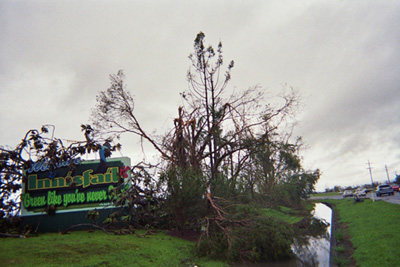
I had been invited to speak at Innisvail State School the day Larry hit
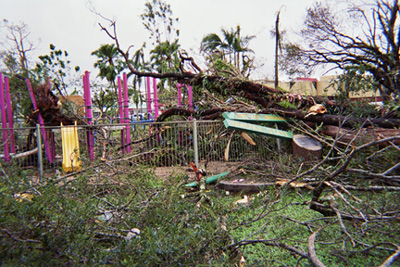
The worst cyclone to hit Queensland in over 30 years
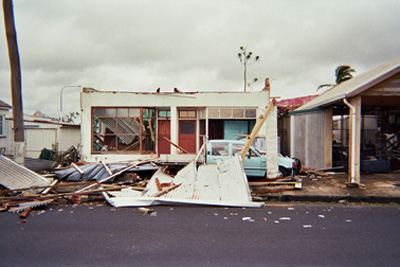
It was a miracle no-one was killed
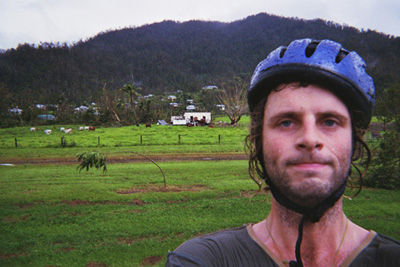
Check out that palm tree!
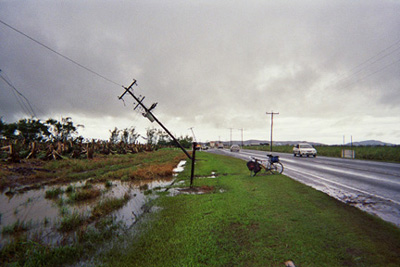
Banana crops (on the left hand side) were decimated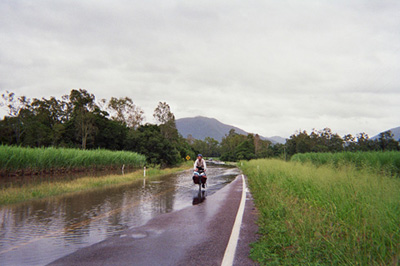
I was fortunate to wade through the post-cyclonic floods, just minutes before the police closed the bridges for several days
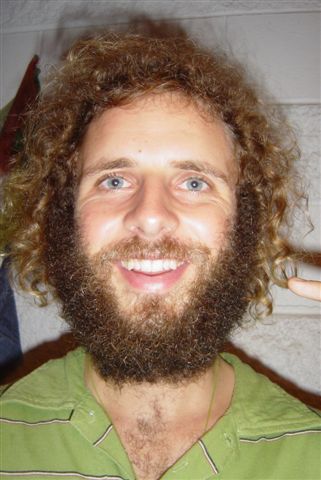
Pre-shave
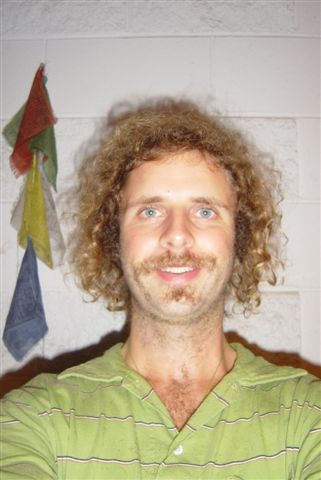
Distinguished moustachio
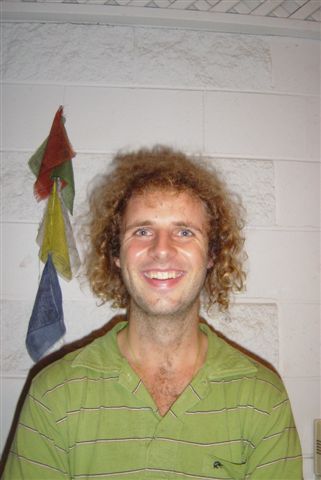
Post-shave
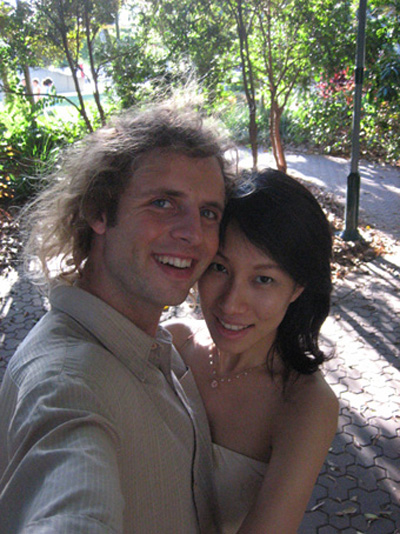
A welcome visitor!
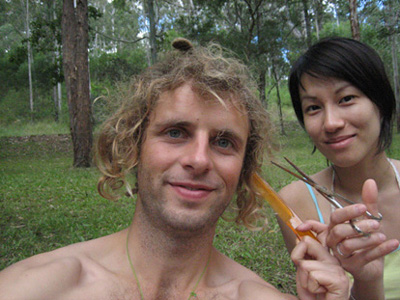
Pre-haircut (plus beautiful hairdresser)
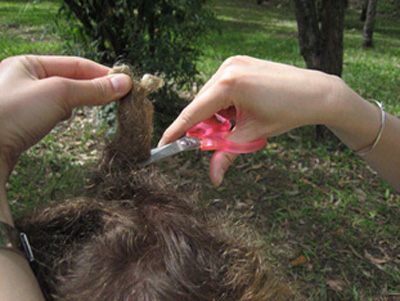
Haircut
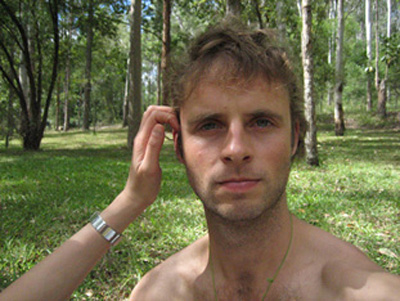
Post-Haircut
Tags: Australia

May 10th, 2006 at 7:39 am
Whoa!
Is New York now calling you??!
May 14th, 2006 at 4:24 am
Have been looking to see if you would make it and am delighted to see you were successful in leaving PNG the way you wanted to. Since leaving us (a year ago nearly now I think) Patrick and I (in Nagoya, Japan) continue to folllow your exploits. Keep it up.
Will